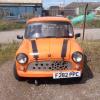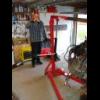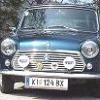Nuts
#1

Posted 22 October 2014 - 11:10 AM
#2

Posted 22 October 2014 - 11:44 AM
Use a Nyloc nut with a flat plain washer. Nyloc nuts are used in aircraft and will not come loose. However, they should only be used once. If removed a new one must be fitted.
#3

Posted 22 October 2014 - 11:56 AM
what,s the most secure way of keeping a nut tight, a plain nut with a spring washer or a nylock nut.?
it depends on the application.
there are places I would use neither.
#4

Posted 22 October 2014 - 12:09 PM
#5

Posted 22 October 2014 - 12:17 PM
please explain.
would you put a nyloc on an exhaust manifold stud and expect it to work? or even a spring washer.
for one singular example.
like I said it all comes down to application.
#6

Posted 22 October 2014 - 12:17 PM
Well the only places I don't use a Nyloc nut is at the front end of the front tie bars and the bolt/nut at the other end of the tie bar. I use a castellated nut with a split pin on both of these because the front one is in tension rather than shear loading and if it comes off the result is dangerous. The bolt at the other end I put in upwards so that I can remove the tie bar without 'popping' the lower swivel joint. So I use the correct high tensile steel bolt fitted upwards and use a 5/16" UNF castellated nut and again a split pin.
Otherwise I can think of nowhere on a Mini where I would not be happy with a Nyloc. Even my gliders have Nylocs on the flying controls and this meets CAA requirements.
#7

Posted 22 October 2014 - 12:39 PM
Well the only places I don't use a Nyloc nut is at the front end of the front tie bars and the bolt/nut at the other end of the tie bar. I use a castellated nut with a split pin on both of these because the front one is in tension rather than shear loading and if it comes off the result is dangerous. The bolt at the other end I put in upwards so that I can remove the tie bar without 'popping' the lower swivel joint. So I use the correct high tensile steel bolt fitted upwards and use a 5/16" UNF castellated nut and again a split pin.
Otherwise I can think of nowhere on a Mini where I would not be happy with a Nyloc. Even my gliders have Nylocs on the flying controls and this meets CAA requirements.
so what about the nuts in your engine?
are you running Hardy Spicer outputs?
what about your hub nuts?
engine mounts?
#8

Posted 22 October 2014 - 01:09 PM
#9

Posted 22 October 2014 - 03:07 PM
In my engine I use whatever is correct, usually the ARP stuff for mains & big ends.
If we are going to talk about engines we are going to get into specific specifications for these, but to make things most people use the commercially available stuff from companies like Mini Spares who sell their own branded quality nuts, studs & bolts, or ARP stuff which is superb, if expensive.
I was assuming the OP was asking about nuts used in general, not the ultra-high-grade engine and gearbox fixings.
As I said, Nyloc is acceptable for aviation and so long as a Nyloc is not re-used works in most dry engineering applications. I use Nyloc on my Hardy Spicer couplings on the 'S' and they work fine. On engine mountings I weld a 5/16" nut to the mount and bolt through. I use Nylocs on the alternator, thermostat, servo mountings, diff casing, steering rack, externally visible engine studs (not manifold studs, obviously), etc.. Of course not on the drive shaft end as it is designed to have that special castellated nut and split pin and there would be little gained by changing that.
One place to use them especially is inside the transfer case where there used to be thin steel lock tabs which were next to useless. Use Loctite on the bolts in there and Nylocs on the studs.
#10

Posted 23 October 2014 - 11:14 AM
#11

Posted 23 October 2014 - 11:54 AM
many thanks, it was only a general question.
unfortunately there is not really a general answer.
often you can interchange one for the other and often one is easier to use than the other.
it all come down to application.
#12

Posted 23 October 2014 - 12:14 PM
As Cooperman has rightly said Nylocs are suitable for most tasks where there is no heat involved. Now for the engine hot areas like the exhaust manifold then a stiff nut can be used or a plain nut with either a sprung washer/ star washer.
Castellated nuts are very good to use but there are certain requirements for these with regards to torque application and the correct sized split pin.
Now if you are good with your hands you can always drill a plain nut and wire lock it. In easy access areas this is a very secure method and works very well. I have done this on a couple of cars on certain components and it also satisfies MOT standards.
Now there is a caveat for any locking device and it's down to how many times it can be reused. Nylocs are normally once only unless it's castellated so in effect it has dual locking. But again think about replacing the castellated Nyloc anyway.
Stiff nuts can be reused but you are supposed to do a run down check on them first, so basically if you can spin it on all the way by finger pressure then it's not fit for use.
Split pins are a one use item only.
Tab washers effectively are the same unless it's a twin tab arrangement. Be careful here though I would always advocate replacing tab washers especially inside and engine if use, the same for a gearbox.
Spring washers need to be checked to see if they have a gap, if so they can be compressed and are fit for use. No gap replace them.
Star washers are generally one use only as they crush down.
Wire locking is one time only.
A plain washer can be reused but do check the state of it.
Plain nuts again are a reusable item.
So that gives you a general over view. The biggest thing here is it needs to be fit for purpose.
#13

Posted 23 October 2014 - 05:05 PM
I am using the same nuts as they were original. In addition all important nuts are sealed with the special red enamel paint for nuts and screws. So it is easy to see if s.th. has moved or not.
To me, especially the drivetrain and supension fastenings seem important to be watched.
#14

Posted 23 October 2014 - 08:51 PM
Nyloc nuts work like a charm, but can be a pain in the butt because of this. You physically have to unwind the whole thread under load, whereas with a spring washer arrangement you can use tools to get started and then loosen by hand to spin off..... so for some applications a captive nut or spring washer set up is more friendly in strip down..
now the whinge....
spring washers are not what they once were. much of the stuff sourced does not hold it shape nor bite and therefore can be a concern as they 'collapse' and loose tension.. even going to reputable bolt and nut companies doesn't seem to fix the quality issue
while on a mini soapbox..... stainless is not necessarily high tension grade..... go and look at the thread on here about sub quality bolts etc....
one final point... try and stay imperial... i get confused enough when slave cylinders need a 10mm, let alone having one hub castle nut 34mm and the other 1 5/16 ? etc, so stick to UNF / UNC on the whole for an early mini
#15

Posted 24 October 2014 - 06:12 AM
what about thread lock too
0 user(s) are reading this topic
0 members, 0 guests, 0 anonymous users



















